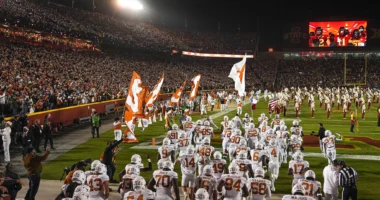When Jerome H. Powell, the Federal Reserve chair, takes the stage at his postmeeting news conference on Wednesday, investors and many Americans will be keenly focused on one question: When will the Fed start cutting interest rates?
Policymakers raised borrowing costs sharply between March 2022 and July, to a 22-year high of 5.25 to 5.5 percent, in a bid to wrestle rapid inflation under control by cooling the economy. They have paused since then, waiting to see how the economy reacted.
But with inflation moderating and the job market growing at a more modest pace, Wall Street increasingly expects that the Fed could start cutting interest rates soon — perhaps even within the first three months of 2024.
Fed officials have been hesitant to say when that might happen, or to even promise that they are done raising interest rates. That’s because they are still worried that the economy could pick back up or that progress taming inflation could stall. Policymakers do not want to declare victory only to have to walk that back.
Mr. Powell is likely to strike a noncommittal tone this week given all the uncertainty, economists said. After their decision on Wednesday, Fed officials will release a fresh quarterly Summary of Economic Projections showing where they think rates will be at the end of 2024, which will indicate how many rate cuts they expect to make, if any. But the projections will offer few hints about when, exactly, any moves might come.
Inflation F.A.Q.
What is inflation? Inflation is a general increase in prices, which will cause a loss of purchasing power over time, meaning your dollar will not go as far tomorrow as it did today. It is typically expressed as the annual change in prices for everyday goods and services such as food, furniture, apparel, transportation and toys.
What causes inflation? It can be the result of rising consumer demand. But inflation can also rise and fall based on developments that have little to do with economic conditions, such as limited oil production and supply chain problems.
Is inflation bad? It depends on the circumstances. Fast price increases spell trouble, but moderate price gains can lead to higher wages and job growth.
How does inflation affect the poor? Inflation can be especially hard to shoulder for poor households because they spend a bigger chunk of their budgets on necessities like food, housing and gas.
Can inflation affect the stock market? Rapid inflation typically spells trouble for stocks. Financial assets in general have historically fared badly during inflation booms, while tangible assets like houses have held their value better.
And both the Fed’s forecasts and Wall Street’s expectations could mask a stark reality: There is a wide range of possible outcomes for interest rates next year, depending on what happens in the economy over the next couple of months.
“We’re kind of at peak uncertainty,” said Michael Gapen, chief U.S. economist at Bank of America.
This week itself should contain no surprises: The Fed is likely to keep rates steady and its options open, Mr. Gapen said. But for next year, he and other economists said, there are three possible scenarios — each of which could call for a very different policy prescription.
Scenario 1: The economy cools sharply, and lower rates come soon.
Interest rates have been weighing on the housing market, discouraging consumers from making big purchases on borrowed money and making it less attractive to expand a business for months now — and the effects could start to add up.
If the economy slows notably at the end of 2023 and the start of 2024, it could prod the Fed to lower interest rates sooner rather than later to avoid tamping down growth so aggressively that the economy plunges into a recession.
If employers cut jobs in December, the Fed could lower interest rates as soon as early 2024, Mr. Gapen said. He said this would be an “easy” scenario for the Fed: It would be obvious that rates needed to come down.
But that is not what most economists expect.
Scenario 2: Inflation keeps cooling, but economic momentum holds up.
Most forecasters think that the economy is likely to continue growing late this year and into next, but more slowly than it has in recent quarters. That gradual cooling should help inflation continue to moderate.
In such a scenario, the key question for the Fed will be when to cut rates — and why. Would it make sense to lower borrowing costs just because inflation is coming down, even if economic data are basically holding up?
Fed officials including John C. Williams, the president of the Federal Reserve Bank of New York, and Christopher Waller, a Fed governor, have suggested that it could. The logic is fairly simple: Interest rates are not adjusted for inflation, so as inflation falls, rates could start to weigh more heavily on the economy in adjusted terms.
“If we see disinflation continuing” and “if we feel confident that inflation is really down,” Mr. Waller said during a Nov. 28 speaking event, “you could then start lowering the policy rate just because inflation is lower.”
The question is when. Mr. Waller suggested that it could take several months of steady progress for officials to feel comfortable.
Scenario 3: Inflation progress stalls or the economy heats back up. Or both.
That leads to the final possibility. Economists have regularly been surprised by the staying power of both economic data and price increases since 2021, and that could happen again.
If the economy and inflation come in hotter than expected, the prescription would be simple. Officials would likely need to raise rates more, as they have indicated repeatedly that they are willing to do.
But more complicated scenarios are possible. The economy could pick up even as inflation cools, for instance, creating a threat that strong demand will lift prices down the road. “I think they would be more reluctant” to cut rates in that case, said Michael Feroli, the chief U.S. economist at J.P. Morgan.
Or progress on inflation could stall even as the economy softens, forcing the Fed to weigh the risk of a recession against permanently elevated inflation.
The many possibilities help explain why the Fed’s policy-setting Federal Open Market Committee is trying to keep its options open.
“Having come so far so quickly, the F.O.M.C. is moving forward carefully,” Mr. Powell said during a Dec. 1 speech.






